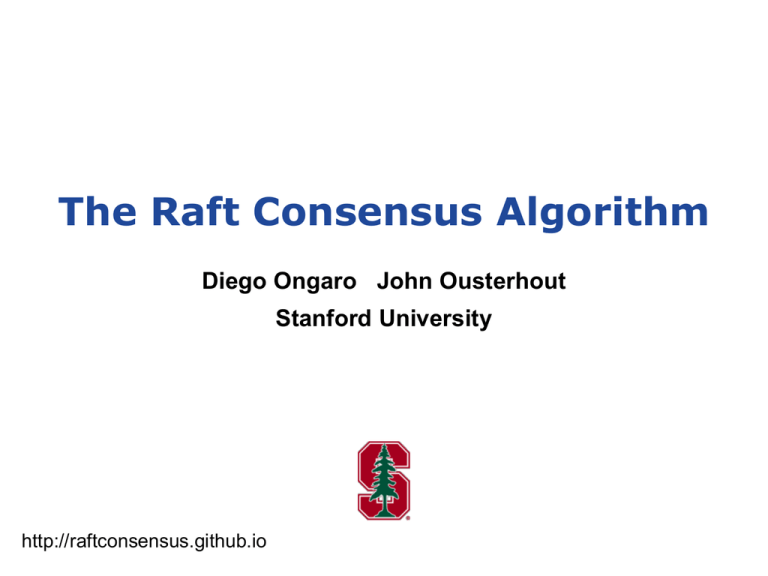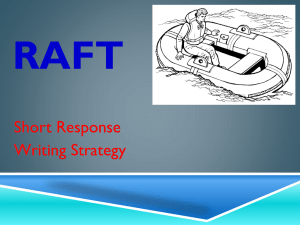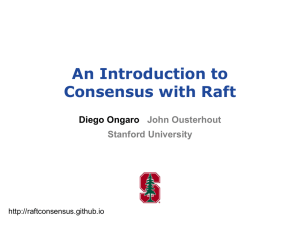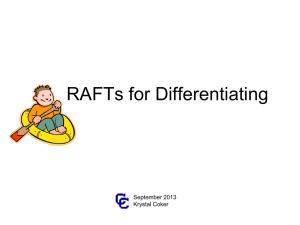What is Consensus? - Raft Consensus Algorithm
advertisement

The Raft Consensus Algorithm Diego Ongaro John Ousterhout Stanford University http://raftconsensus.github.io What is Consensus? ● Agreement on shared state (single system image) ● Recovers from server failures autonomously Minority of servers fail: no problem Majority fail: lose availability, retain consistency Servers ● Key to building consistent storage systems September 2014 Raft Consensus Algorithm Slide 2 Inside a Consistent System ● TODO: eliminate single point of failure ● An ad hoc algorithm “This case is rare and typically occurs as a result of a network partition with replication lag.” – OR – ● A consensus algorithm (built-in or library) Paxos, Raft, … ● A consensus service ZooKeeper, etcd, consul, … September 2014 Raft Consensus Algorithm Slide 3 Replicated State Machines Clients z6 Consensus Module State Machine Consensus Module State Machine Consensus Module State Machine x 1 x 1 x 1 y 2 y 2 y 2 z 6 z 6 z 6 Log x3 y2 x1 z6 Log x3 y2 x1 z6 Log x3 y2 x1 z6 Servers ● Replicated log replicated state machine All servers execute same commands in same order ● Consensus module ensures proper log replication ● System makes progress as long as any majority of servers are up ● Failure model: fail-stop (not Byzantine), delayed/lost messages September 2014 Raft Consensus Algorithm Slide 4 How Is Consensus Used? ● Top-level system configuration ● Replicate entire database state September 2014 Raft Consensus Algorithm Slide 5 Paxos Protocol ● Leslie Lamport, 1989 ● Nearly synonymous with consensus “The dirty little secret of the NSDI community is that at most five people really, truly understand every part of Paxos ;-).” – NSDI reviewer “There are significant gaps between the description of the Paxos algorithm and the needs of a real-world system…the final system will be based on an unproven protocol.” – Chubby authors September 2014 Raft Consensus Algorithm Slide 6 Raft’s Design for Understandability ● We wanted the best algorithm for building real systems Must be correct, complete, and perform well Must also be understandable ● “What would be easier to understand or explain?” Fundamentally different decomposition than Paxos Less complexity in state space Less mechanism September 2014 Raft Consensus Algorithm Slide 7 Raft User Study Quiz Grades Survey Results September 2014 Raft Consensus Algorithm Slide 8 Raft Overview 1. Leader election Select one of the servers to act as cluster leader Detect crashes, choose new leader 2. Log replication (normal operation) Leader takes commands from clients, appends them to its log Leader replicates its log to other servers (overwriting inconsistencies) 3. Safety Only a server with an up-to-date log can become leader September 2014 Raft Consensus Algorithm Slide 9 RaftScope Visualization September 2014 Raft Consensus Algorithm Slide 10 Core Raft Review 1. Leader election Heartbeats and timeouts to detect crashes Randomized timeouts to avoid split votes Majority voting to guarantee at most one leader per term 2. Log replication (normal operation) Leader takes commands from clients, appends them to its log Leader replicates its log to other servers (overwriting inconsistencies) Built-in consistency check simplifies how logs may differ 3. Safety Only elect leaders with all committed entries in their logs New leader defers committing entries from prior terms September 2014 Raft Consensus Algorithm Slide 11 Randomized Timeouts ● How much randomization is needed to avoid split votes? ● Conservatively, use random range ~10x network latency September 2014 Raft Consensus Algorithm Slide 12 Raft Implementations (Stale) go-raft Go Ben Johnson (Sky) and Xiang Li (CoreOS) kanaka/raft.js JS Joel Martin hashicorp/raft Go Armon Dadgar (HashiCorp) rafter Erlang Andrew Stone (Basho) ckite Scala Pablo Medina kontiki Haskell Nicolas Trangez LogCabin C++ Diego Ongaro (Stanford) akka-raft Scala Konrad Malawski floss Ruby Alexander Flatten CRaft C Willem-Hendrik Thiart barge Java Dave Rusek harryw/raft Ruby Harry Wilkinson py-raft Python Toby Burress … September 2014 Raft Consensus Algorithm Slide 13 Facebook HydraBase Example https://code.facebook.com/posts/321111638043166/hydrabase-the-evolution-of-hbase-facebook/ September 2014 Raft Consensus Algorithm Slide 14 Conclusions ● Consensus widely regarded as difficult ● Raft designed for understandability Easier to teach in classrooms Better foundation for building practical systems ● Paper/thesis covers much more Cluster membership changes (simpler in thesis) Log compaction (expanded tech report/thesis) Client interaction (expanded tech report/thesis) Evaluation (thesis) September 2014 Raft Consensus Algorithm Slide 15 Questions raftconsensus.github.io September 2014 Raft Consensus Algorithm Slide 16










